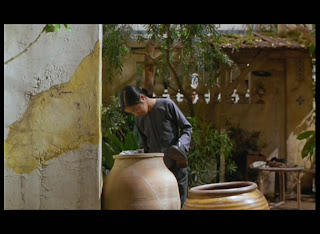
France/Vietnam, 1993
Relying more on tone and feel rather than on plot, and focusing more on moments than characters, “The Scent of Green Papaya” shows a glimpse of life in Vietnam prior to the country being torn by war and revolution. It captures astonishingly the grace and beauty of a bygone era.
“The Scent of Green Papaya” is a simple tale of two periods in the life of a peasant Vietnamese girl named Mui (Lu Man San at the age of 10; Tran Nu Yen-Khe, the director's real-life fiancée at age of 20). The first section takes place in 1951 and shows Mui, a young, poor Vietnamese country girl as she leaves her family (whom we never see), and arrives at the troubled house of well- off merchant family in Saigon, where she will spend the next ten years of her life working as a servant. As Mui grows and the family's fortunes fade. In 1961, the 20-year-old Mui is still content working in same household, but due family's financial problems, they have to release her from the service, and she ends up working for Khuyen, bourgeois pianist and composer, long time family friend, whom she has secretly adored since childhood. She has known this man ever since they both were children. He was the playmate of her employer's son. Now, sophisticated Francophile and Western-thinker, he and Mui find themselves engaged in a mutual seduction. With only the minimum of dialogue, this classic Cinderella-like story is a sensual, visually delicious film.
The early scenes show Mui’s introduction to new place, as she learns to cook and perform her chores, and as the youngest son of her new employer's besets her. Mui’s character remains relatively mute as she observes the world around her. Through her eyes, we witness the day-to-day activities of the household and understand the way it works. Mui is teached to perform her duties by the old servant, who carefully shows her how to prepare the papaya (traditionally woman's work) and answers all the child's curious questions about the household. Her life are centered on the kitchen, and a vegetable garden.The child will serve the meals, clean the house, wash the clothes, and run errands. While Mui adapts effortlessly to her responsibilities, doing her chores in an unobtrusive manner, the merchant family doesn't do so well. Early on, she learns that her new masters have lost the only daughter named Tó, who would have been just about Mui's age, so over the time, the mother becomes especially fond of her, as Mui becomes like a daughter for her. The mother, perpetually bereaved, runs the family textile business and silently suffers abandonment. The father, a self-centered man of dubious integrity, has a history of womanizing and disappearing for long periods with all his family's savings. That provokes two youngest sons to act out their anger and behave unruly. Mourning grandmother never leaves her upstairs bedroom/prayer altar and blames the the women, her son wife, for his absences. Yet all this unhappiness and impoverishment is beneath the surface, hidden from direct view.
The film is about everyday spirituality from an Eastern perspective. Mui, as a young girl, has learned the art of stopping the world. For her, there is beauty in the smallest details. She savours the sunlight through the green leaves outside the window, the scent of green papaya, the drop of water trembling on a leaf and looks with wonder at ants carrying a heavy load. From a gentle, grandfatherly neighbour she learned the ability to love from a distance. Mui is a sweet girl with a radiant smile, someone who finds satisfaction in life, even working as a poor servant.
It's a stunning first feature, even though it moves very very slowly and the acting is uneven. The second part of the film pales in comparison to part one, and that is because the innocent and cute Mui as a child is the glue that holds the film together and make it so special. The older Mui isn't as impressive, she doesn't radiate the same warmth on the screen. Tran Nu Yen-Khe's body language seems odd and inappropriate to the circumstances. The use of sound effects is excellent, in a film with so little dialogue, music and sound effects become critical contributors. What “The Scent of Green Papaya” does so well is showing the lost Vietnam, peaceful and orderly place not yet touched by wartime and everyday life of a traditional culture that, has been bombed into history. Ironically, “The Scent of Green Papaya” was filmed entirely on a sound stage in Paris. Everything we see is a set. The director, Anh Hung Tran (born in Vietnam but relocated and educated in France) undoubtedly found it impossible to make a film of this type in today's Vietnam, which is hardly nostalgic for the colonial era. "The Scent of Green Papaya" is a quiet, sensuous, apolitical, slow-paced film which makes it a point to clearly detail the everyday existence in the Vietnam that no longer exists, if ever existed at all...















